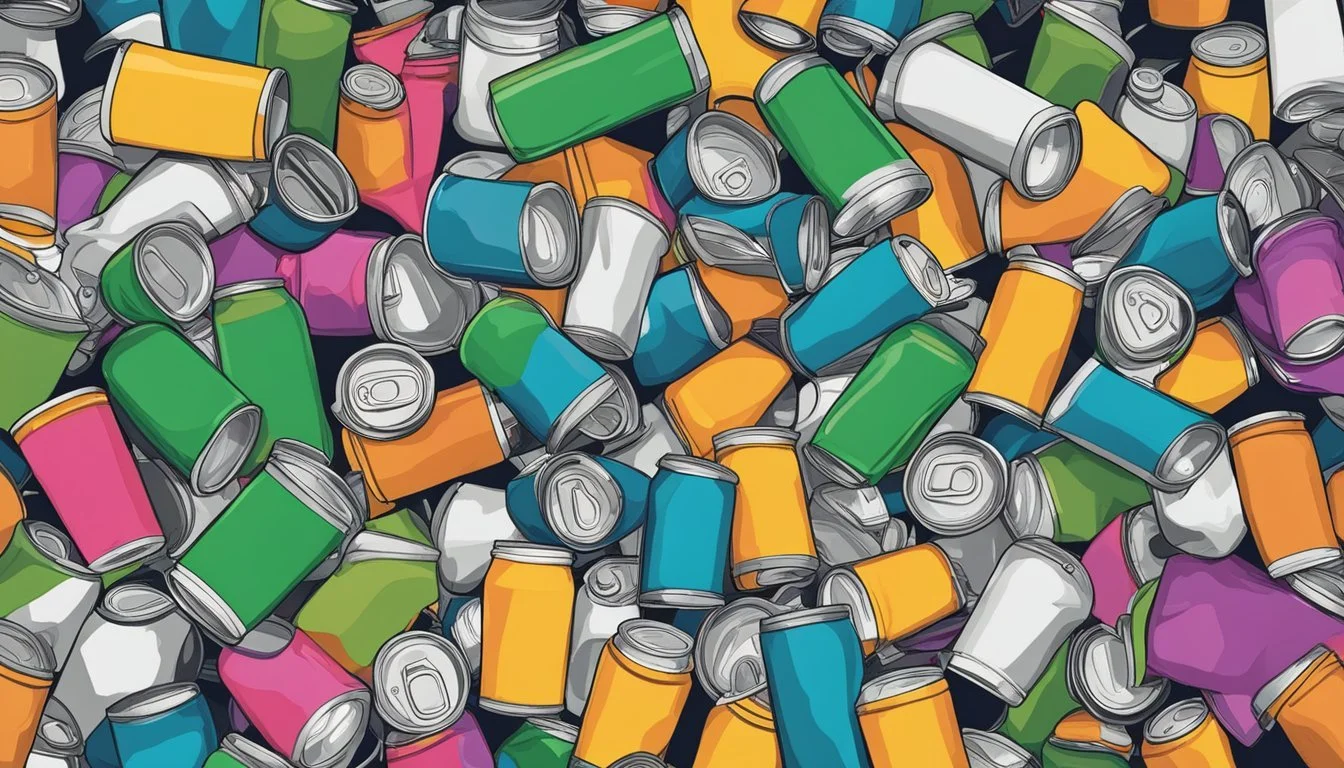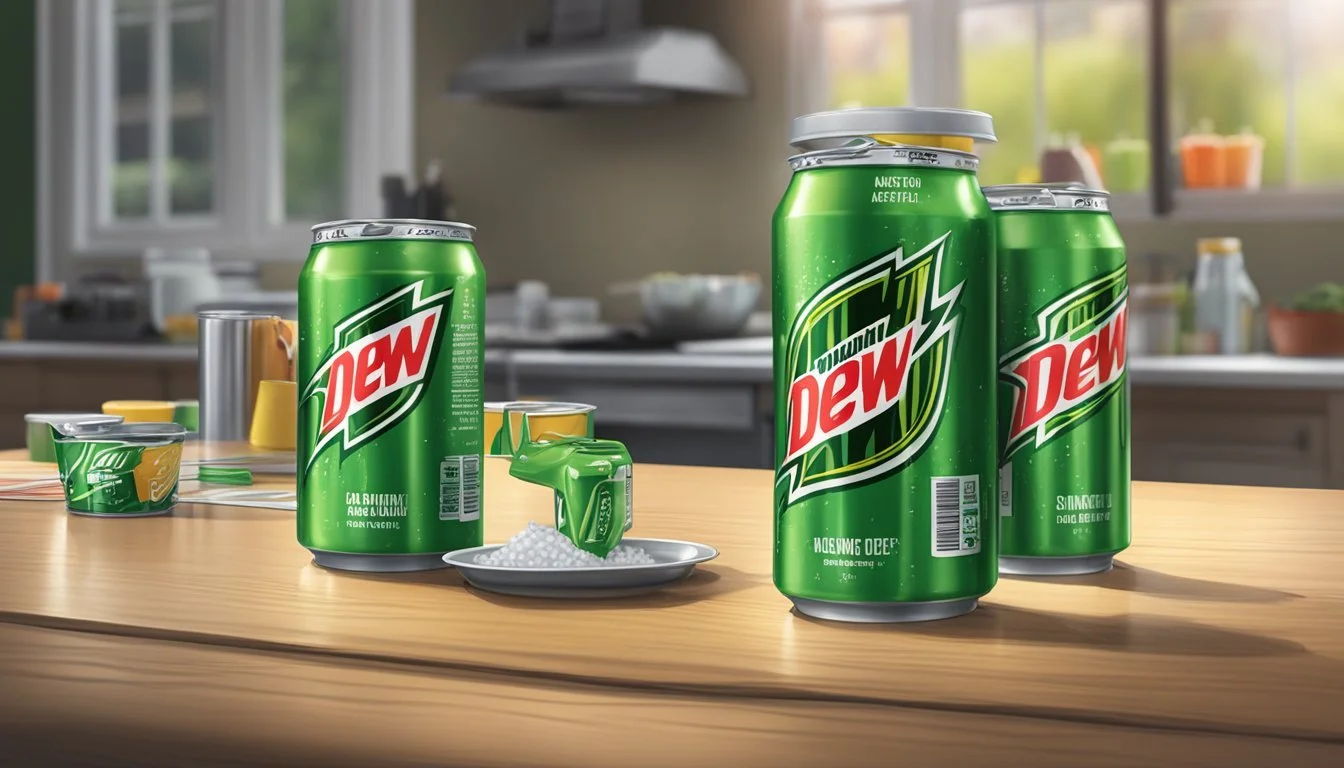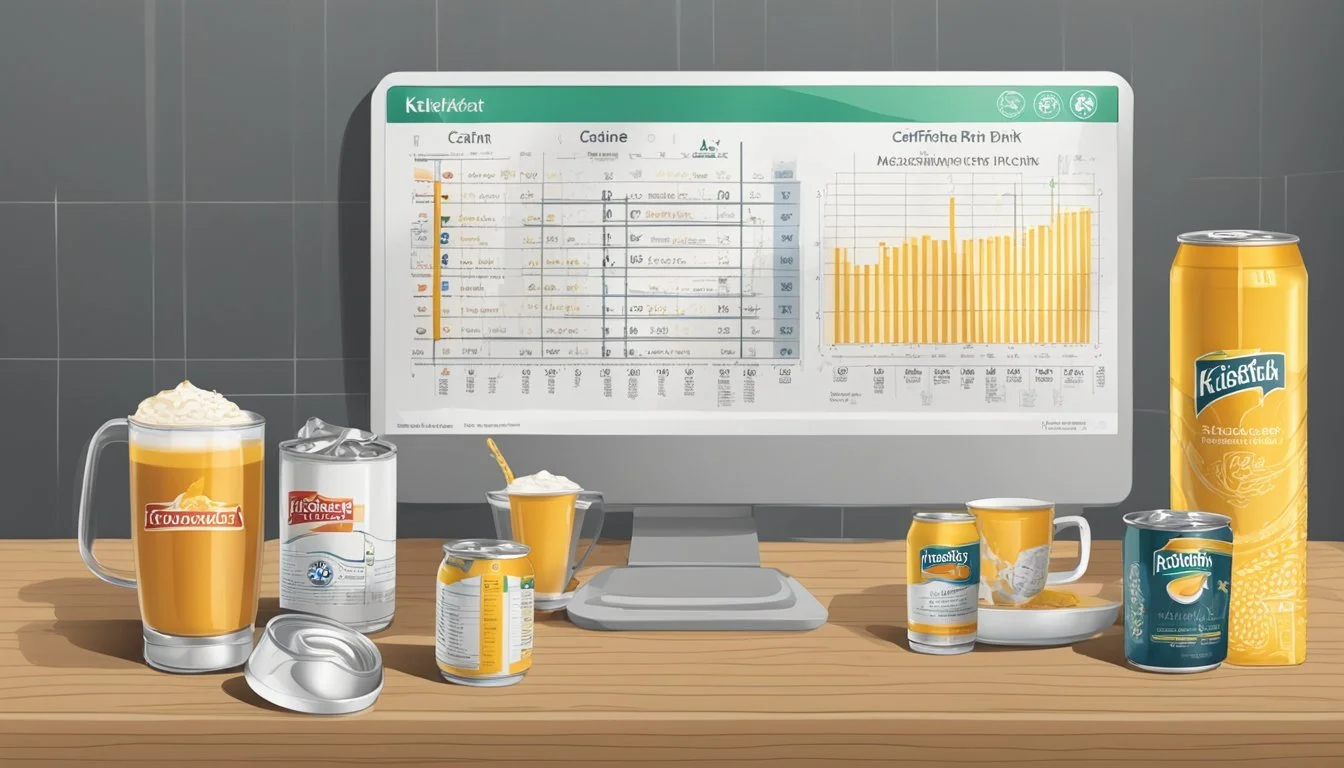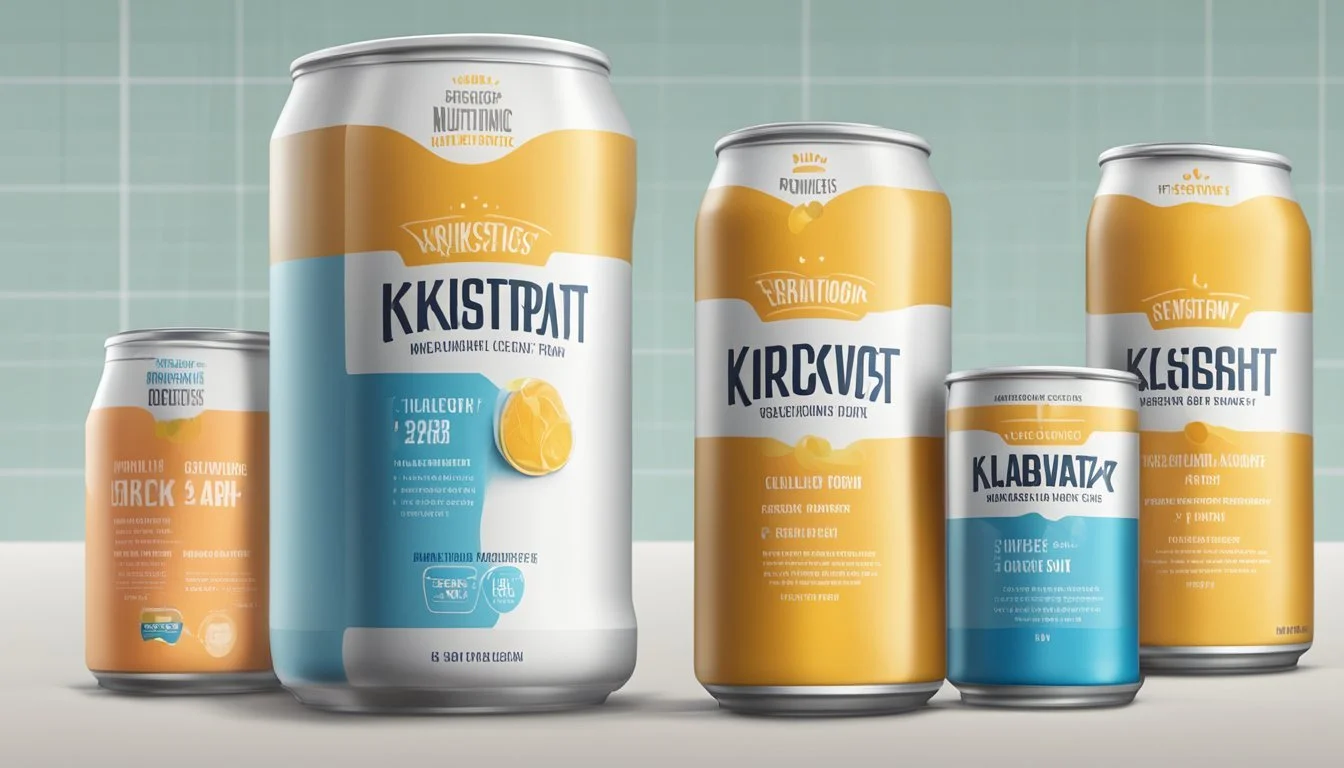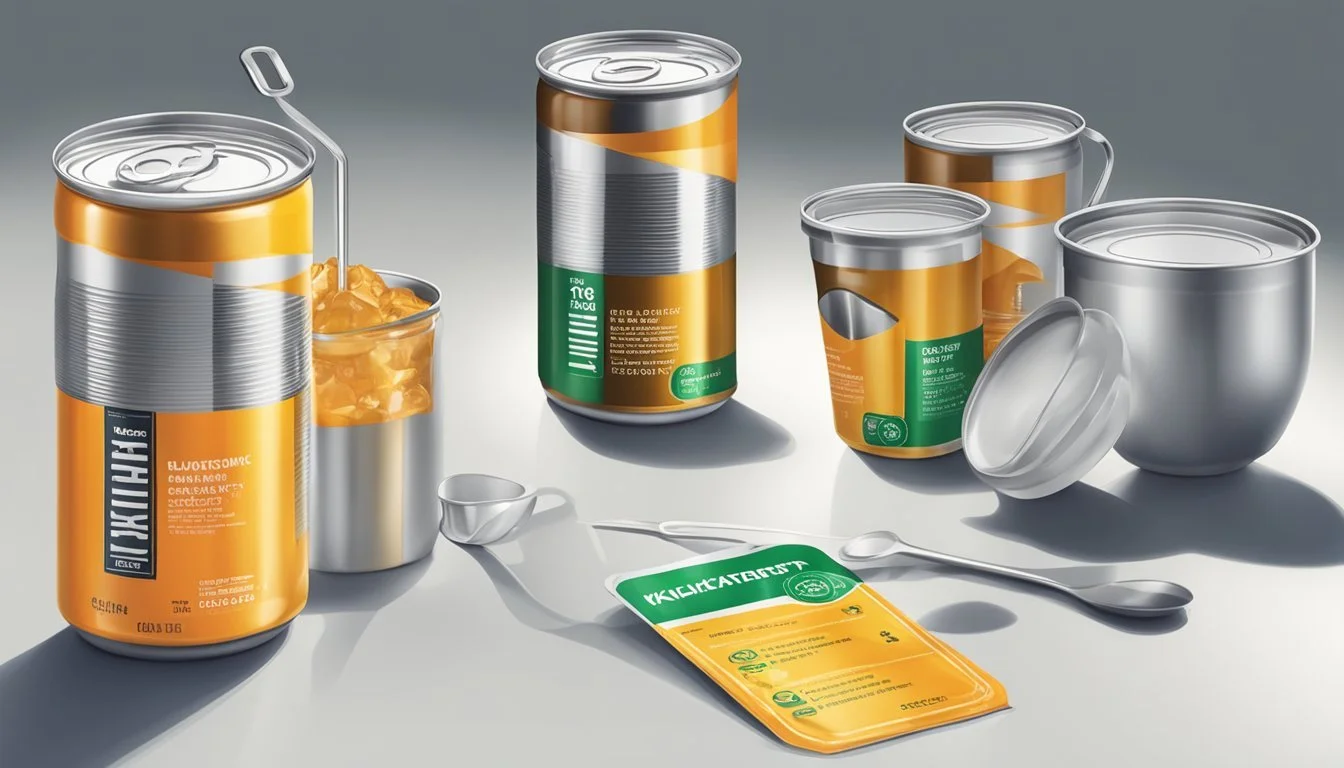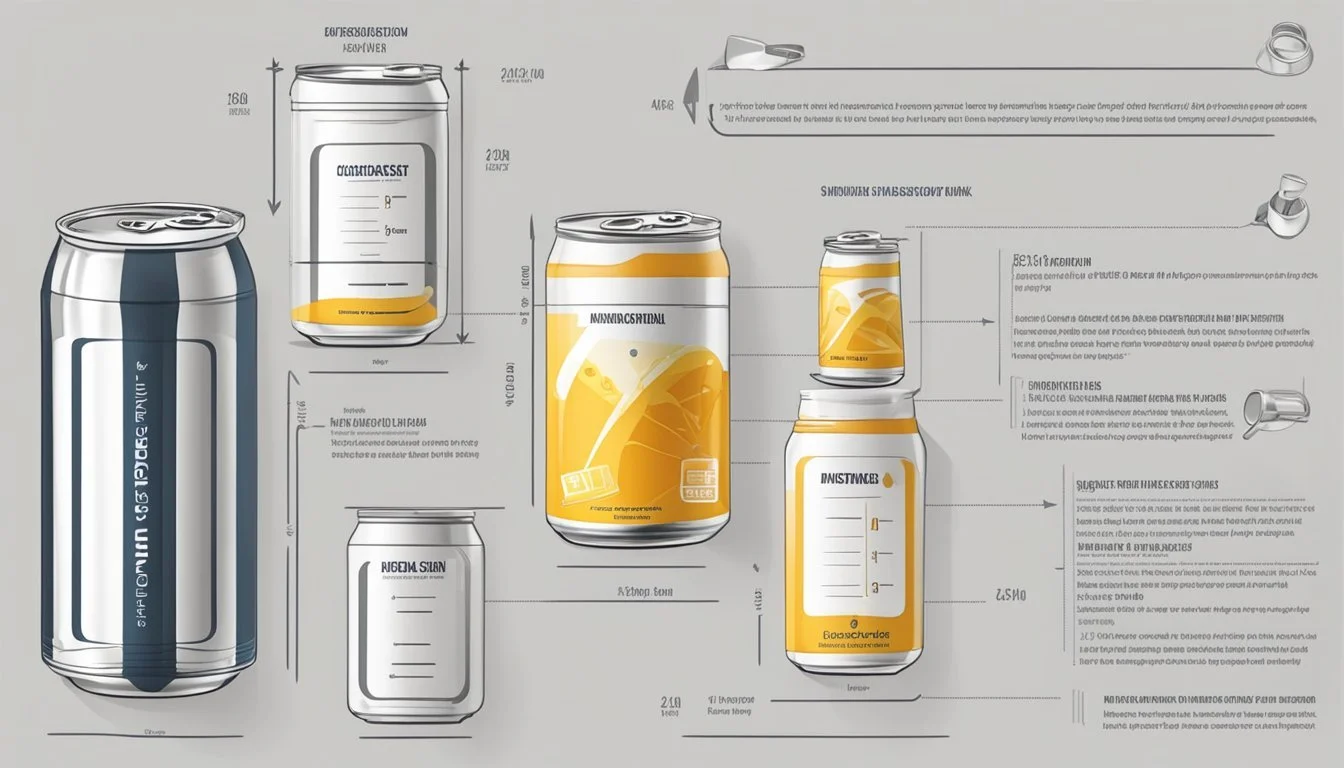How Many Servings of Kickstart Drink Is Too Much
Expert Guidelines and Health Risks
For those who enjoy a quick energy boost, Mountain Dew Kickstart offers a refreshing option with its modest caffeine content and appealing taste. With just 90 milligrams of caffeine and 80 calories per 16-ounce can, it stands out from other energy drinks that often contain higher amounts of both caffeine and calories. While one can is generally safe for most individuals, consuming too many can quickly exceed recommended daily caffeine intake.
Health experts recommend that adults should not consume more than 400 milligrams of caffeine per day. Considering this, more than four cans of Mountain Dew Kickstart could put you at risk of side effects such as jitteriness, heart palpitations, or even more severe health issues. This is especially important for those who have a lower tolerance to caffeine or existing health conditions.
Beyond caffeine, it's also important to think about the sugar content in Kickstart, which includes around 20 milligrams per can. Too much sugar can contribute to weight gain and other health problems. Moderation is key when enjoying any energy drink, and being mindful of the total intake throughout the day will help maintain both energy levels and overall health.
Overview of Mountain Dew Kickstart
Mountain Dew Kickstart is a popular beverage designed to blend the flavor of Mountain Dew with the benefits of an energy drink. This section goes into detail about the key ingredients, nutritional value, and available flavor varieties.
Key Ingredients
Mountain Dew Kickstart contains a mix of ingredients to provide its distinctive taste and energy boost. The primary components include carbonated water, high fructose corn syrup, and white grape juice concentrate.
For sweetness and flavor enhancement, it uses sucralose and acesulfame potassium. Caffeine is a key ingredient, providing the stimulating effect, while citric acid and gum arabic are used for flavor and texture. Stabilizers like potassium sorbate, potassium citrate, and calcium disodium EDTA help maintain the drink's shelf life. Color additives like Blue 1 and Red 40 are included for visual appeal.
Nutritional Value
Each 16 fl. oz. can of Mountain Dew Kickstart contains around 80 calories, primarily from its 20 grams of sugar. The drink provides 90 milligrams of caffeine, less than many other energy drinks but still enough to offer a noticeable boost.
Sodium content is about 170 milligrams, adding to daily electrolyte intake. It contains negligible amounts of fat and protein, focusing instead on delivering energy through sugar and caffeine. The inclusion of juice adds a small amount of vitamins and minerals, but these are not significant compared to the other components.
Flavor Varieties
Mountain Dew Kickstart is available in a range of flavors to cater to varied consumer preferences. Common options include Black Cherry, Orange Citrus, and Midnight Grape. These flavors are crafted to combine Mountain Dew's classic taste with an energizing twist.
Specialty flavors like Pineapple Orange Mango and Fruit Punch offer unique alternatives for those seeking diversity in their beverage choices. Each flavor maintains the fundamental ingredients but adjusts the balance of fruit juices and flavorings to create distinct taste experiences.
Caffeine Content and Considerations
Mountain Dew Kickstart contains caffeine, which is a key point of interest for consumers considering their daily intake. Below are important comparisons and guidelines related to its caffeine content.
Comparing to Coffee and Tea
A 16 fl oz can of Mountain Dew Kickstart contains 90 milligrams (mg) of caffeine. In comparison, a standard 8 fl oz cup of coffee typically has around 95 mg of caffeine, though this can vary significantly depending on the brewing method and type of coffee bean. Tea tends to have less caffeine, with a standard 8 fl oz cup containing between 20 to 50 mg.
Therefore, one serving of Kickstart offers a moderate amount of caffeine, comparable to a cup of coffee, but significantly more than most servings of tea.
Understanding Caffeine Tolerance
Caffeine tolerance varies widely between individuals due to factors such as genetics, age, weight, and overall health. Regular consumption can lead to a tolerance, where higher amounts are needed to achieve the same effects. Some people may experience jitters, anxiety, or sleep disturbances even with low doses of caffeine. Symptoms of excessive intake can include restlessness, rapid heart rate, and insomnia.
Thus, understanding personal tolerance is critical when considering how many servings of an energy-enhanced beverage like Kickstart is appropriate.
Recommended Maximum Intake
The FDA suggests that up to 400 mg of caffeine per day is generally considered safe for most adults. This would be equivalent to over four cans of Mountain Dew Kickstart. However, this amount can vary vastly depending on individual sensitivity and the presence of other caffeine sources in one’s diet.
For many, limiting intake to 1-2 servings of Kickstart can help avoid negative side effects, especially when combined with other caffeinated beverages. Monitoring overall daily consumption is crucial to maintain a safe and healthy balance.
Health Implications of Consumption
Consuming too many servings of Kickstart can lead to various health issues, affecting both the short-term and long-term well-being of an individual. This section outlines the immediate energy boost as well as the potential risks related to sugars and artificial sweeteners in the drink.
Short-Term Effects and Energy Boost
Kickstart, like other energy drinks, provides a quick energy boost due to its caffeine content. This can enhance alertness and reduce fatigue temporarily. Individuals consuming Kickstart report increased concentration and improved athletic performance.
However, the short-term effects also include potential side effects. Consuming too much caffeine can lead to insomnia, jitteriness, and an increased heart rate. Users may experience a "sugar crash" after the initial energy surge dissipates.
Potential Health Risks
Long-term, high consumption of Kickstart poses several health risks. Regular intake can contribute to high blood pressure and an increased risk of heart disease. Additionally, the high caffeine content may result in chronic insomnia and anxiety.
Extended consumption can lead to dehydration, primarily due to its diuretic effect. Overuse of energy drinks has also been linked to weight gain and obesity, as these beverages often contribute to daily calorie intake without providing any nutritional benefits.
Sugars and Sweeteners Impact
Kickstart contains a significant amount of sugar and artificial sweeteners. High sugar intake can lead to obesity and an increased risk of developing type 2 diabetes. The sugars also contribute to fatty liver disease when consumed excessively.
Artificial sweeteners present their own set of health concerns. Some studies suggest they may contribute to weight gain and may have adverse effects on the body's metabolism. Additionally, excessive consumption of sugar and sweeteners can increase the risk of heart disease.
Overall, moderating the intake of Kickstart is crucial to minimizing these health risks and maintaining a balanced, healthy lifestyle.
Comparative Analysis with Other Beverages
Mountain Dew Kickstart contains 90 mg of caffeine per 16 oz can and 80-100 calories, which is a unique profile among various energy drinks and soft beverages. To understand the impact, let's compare it with popular alternatives in terms of caffeine content, calories, and health implications.
Energy Drinks Like Red Bull and Monster Energy
Red Bull and Monster Energy typically have higher caffeine content than Mountain Dew Kickstart. Red Bull contains 80 mg of caffeine per 8.4 oz can, and Monster Energy packs 160 mg of caffeine per 16 oz can. This makes Monster Energy almost double the caffeine concentration of Kickstart.
In terms of calories, a 16 oz can of Monster Energy usually has around 210 calories, significantly higher than Kickstart’s 80-100 calories.
While both Red Bull and Monster Energy deliver a more intense caffeine punch, they also come with higher calorie counts, which could contribute to an increased risk of weight gain and related health issues.
Soda and Soft Drinks
Comparing Kickstart with regular sodas like Coca-Cola, which has about 34 mg of caffeine per 12 oz can, makes it clear that Kickstart has more than double the caffeine content.
Pepsi has a similar profile with 38 mg of caffeine per 12 oz can. Both sodas are also high in sugar and comparable in calories to Kickstart, boasting around 150 calories per can, which aligns more closely with Kickstart's caloric content but with far lower caffeine quantities.
The nutritional value of sodas is generally considered low, and while Kickstart offers a caffeine boost, consumers should be mindful of the extra energy intake from calories and sugar.
Sugar-Free and Calorie-Free Alternatives
For those looking for caffeine without the added calories, drinks like Black Coffee or sugar-free energy drinks (e.g., Monster Zero Ultra) may be preferable. Black Coffee contains zero calories and can have anywhere from 95 to 200 mg of caffeine per 8 oz cup, offering a strong caffeine hit without caloric impact.
Monster Zero Ultra delivers 140 mg of caffeine per 16 oz can with zero calories, providing a potent energy boost free from sugar and calories.
These sugar-free options mitigate potential weight gain and other health risks associated with high caloric intake while still delivering significant caffeine levels for energy and alertness.
Consumption Guidelines
To maintain health, it's crucial to understand how much Kickstart drink is appropriate in a balanced diet. Various factors, like sugar content and overall nutrition, play a role in determining safe consumption levels.
Daily Intake Recommendations
When considering daily intake, one should be mindful of the sugar content and calories in each serving of Kickstart. An average can of Kickstart contains 92 milligrams of caffeine and around 20 grams of sugar. For reference, the recommended daily sugar limit is 25 grams for women and 36 grams for men.
Consuming more than one serving can quickly exceed these limits and contribute to unnecessary calorie intake. Balance is key; integrating servings into meals can help avoid excessive sugar and calories while still enjoying the drink.
Moderation and Balanced Diet
Moderation is vital in integrating Kickstart into a balanced diet. Excessive consumption may lead to issues such as sugar spikes and increased calorie intake, which can have long-term health impacts. It's recommended to limit intake to one serving per day to avoid surpassing daily sugar limits and maintain a healthy diet.
Integrating Kickstart as part of a meal, rather than as a standalone snack, can help in managing its nutritional impact. It’s also beneficial to consume plenty of water and maintain a diet rich in whole foods, which contribute to overall health and well-being.
Practical Tips for Consumers
Consumers can enjoy Mountain Dew Kickstart safely by being mindful of their intake and considering healthier alternatives. Awareness of overconsumption signs is crucial to avoid adverse effects.
Alternative Hydration Options
Mountain Dew Kickstart may provide an energetic boost, but it's wise to explore healthier alternatives. Hydrating Boost drinks like coconut water or fruit-infused water offer natural hydration without the high levels of caffeine and high-fructose corn syrup.
Green tea is another viable option with antioxidants and a moderate amount of caffeine. For those seeking a processed food-free option, homemade smoothies containing ingredients like spinach and berries can provide both energy and nutrition.
These alternatives support a healthy lifestyle without the risk of caffeine overdose.
Recognizing Overconsumption Signs
Understanding the signs of overconsumption is key to maintaining health. Heart palpitations, restlessness, and headaches can indicate excessive caffeine intake. Caffeine overdose can lead to severe symptoms such as nausea and elevated blood pressure.
Frequent intake of Mountain Dew Kickstart, especially in amounts surpassing recommended servings, can heighten these risks. Keeping track of overall caffeine consumption from all sources ensures safety. Recognizing these symptoms early allows for timely adjustments to one's diet and beverage choices.
Positive and Adverse Effects on Performance
Mountain Dew Kickstart provides both benefits and risks in terms of performance. While it can enhance alertness and focus, it also poses potential health risks when consumed excessively.
Boosting Alertness and Focus
Mountain Dew Kickstart contains 90 milligrams of caffeine per 16 fl. oz. can, which helps in boosting alertness and focus. Caffeine is a well-known stimulant that acts quickly to improve cognitive function and reaction time. For individuals needing a quick pick-me-up, this drink can temporarily enhance mental clarity and concentration.
Additionally, Kickstart’s combination of sugars and caffeine can improve mood and provide an energy boost. This makes it suitable for situations requiring immediate mental sharpness, such as studying or working on tight deadlines. However, the effects can vary depending on individual tolerance levels.
Impact on Physical Performance
The caffeine in Mountain Dew Kickstart also has benefits for physical performance. It can enhance endurance and reduce perceived effort during workouts. Caffeine stimulates the central nervous system, making physical tasks feel less strenuous and allowing for longer and more intense exercise sessions.
Moreover, the energy boost from the sugar content provides quick fuel for physical activities. This can be particularly useful for short bursts of high-intensity exercises. Yet, unlike specialized sports drinks, Kickstart lacks significant electrolytes, which are crucial for sustained physical activities.
Risks of High Consumption
Consuming excessive amounts of Mountain Dew Kickstart poses several health risks. High caffeine consumption can lead to undesirable side effects such as jitteriness, increased heart rate, and insomnia. The 20 grams of sugar per can also adds up quickly, contributing to potential weight gain and tooth decay.
Furthermore, regular consumption can increase the risk of caffeine dependency and subsequent withdrawal symptoms, including headaches and irritability. Drinking multiple cans in a short period heightens the risk of dehydration and kidney strain due to caffeine’s diuretic effect.
In summary, while Mountain Dew Kickstart can temporarily boost performance, moderation is crucial to avoid adverse health effects. Balancing the benefits and risks is essential for safe consumption.
Navigating the Regulatory Environment
When consuming energy drinks like Mountain Dew Kickstart, understanding the regulations and labels is crucial for making informed decisions. The key points discussed include FDA regulations specific to energy drinks and the importance of nutritional labels for these beverages.
FDA Regulations on Energy Drinks
The FDA oversees the safety and labeling of energy drinks. These drinks are treated as dietary supplements or conventional food, each subject to different regulations. For example, if an energy drink is marketed as a dietary supplement, it must list ingredients and their amounts, and meet Current Good Manufacturing Practices (CGMPs).
Caffeine content is a significant regulatory focus. The FDA recommends that healthy adults limit their caffeine intake to 400 mg per day. Given that a 16 fl. oz can of Mountain Dew Kickstart contains 90 mg of caffeine, consuming more than four cans could exceed the recommended limit.
Labeling honesty and accuracy are also enforced by the FDA. Energy drink manufacturers must provide clear information on the can, including a list of ingredients and nutritional facts, to ensure consumers make safe choices.
Understanding the Label
Navigating the label of an energy drink like Mountain Dew Kickstart reveals important information about its nutritional value. A standard 16 fl. oz can contains 80 calories, 90 mg of caffeine, 20 grams of sugar, and 170 mg of sodium. These values help consumers understand the potential impact on their health and nutrition.
Caffeine content is prominently listed due to its effect on alertness and energy levels. Sugar and sodium levels should also be noted, as high intake can affect overall health. Comparing these values to regular Mountain Dew can provide perspective; for instance, regular Mountain Dew contains more sugar but less caffeine.
Understanding these labels helps consumers align their intake with their health goals and regulatory guidelines. Clear and well-labeled nutritional facts are essential to ensuring safe consumption habits.

